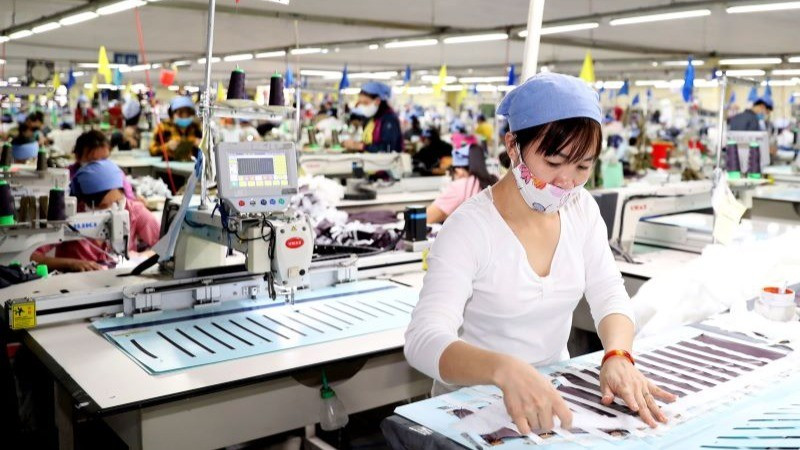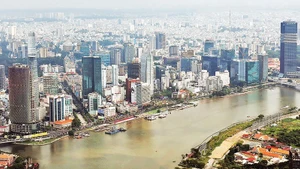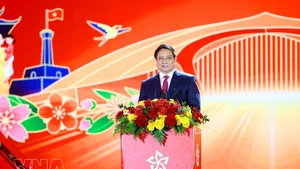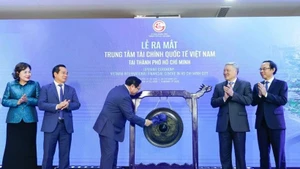According to Minister of Planning and Investment Nguyen Chi Dung, the socio-economic development results since the beginning of the year show that the economy has regained its pre-pandemic growth momentum, with the macroeconomy being fundamentally stable, inflation kept under control, and major balances ensured.
Public investment breakthrough
The greatest room for growth in the final months of the year will be public investment. As of November 31, 2024, public investment disbursement was estimated to reach 54.8% of the annual plan and 60.43% of the prime minister’s assigned plan.
According to regulations, the deadline for completing public investment disbursement procedures for 2024 extends until the end of January 2025. Therefore, there is significant pressure for disbursement in the remaining months, especially for localities that allocated large public investment funds such as Hanoi and Ho Chi Minh City.
Tran Quoc Phuong, Deputy Minister of Planning and Investment, stated that the ministry has advised numerous solutions for the government and prime minister to issue decisions and resolutions to promote public investment disbursement.
Accordingly, from now until the end of the year, focus will be on solutions to supervise and direct project implementation and disbursement progress. Project investors need to expedite the necessary procedures to disburse the large amount of capital still pending in the plan.
Ministries, agencies and localities must immediately review their capital plans as the basis for adjusting capital from slow projects to well-disbursing projects to fully utilise the total capital allocated by the prime minister.
The breakthrough solution for public investment lies in institutional reform. The amended Public Investment Law, effective from January 1, 2025, will fundamentally resolve many longstanding issues. This will create a synchronised legal basis to immediately implement new regulations in public investment disbursement for 2025 as well as in preparing and implementing the medium-term public investment plan for the 2026-2030 period.
One of the bright spots in Vietnam’s economy is the strong growth in commodity export and import. Notably, the domestic economic sector has made exceptional efforts, achieving higher growth rates in import and export than the foreign direct investment (FDI) sector. For the entire year of 2024, import-export turnover is expected to exceed 800 billion USD for the first time, with an estimated trade surplus of over 23 billion USD.
Support package for businesses under consideration
According to the General Statistics Office, Vietnam’s economy is returning to a high growth trajectory, with the economic structure shifting positively towards digital economy development; green economy; an increase in the share of industry, construction and services sectors; and a reduction in the proportion of the agricultural sector.
Specifically, by the end of the third quarter, the industry, construction and services sectors accounted for 79.9% of GDP while agriculture only accounted for 11.64%. Within these sectors, industry is showing positive recovery and serves as an important driver, leading the growth of the entire economy
Notably, the industrial production index of most localities with large industrial scale has increased compared to the previous month and the same period in 2023, indicating that industrial enterprises have adapted and achieved positive growth.
In its role as the chief architect of the economy, the Ministry of Planning and Investment has advised the government and various ministries, agencies and localities to implement key tasks and solutions to accelerate the economy towards its targets.
This includes continuing to prioritise resources for institutional improvement, identifying institutional perfection as the “breakthrough of breakthroughs”, and creating a favourable and open environment for production, business and investment. Simultaneously, there is a push to strongly promote and renew traditional growth drivers in investment, consumption and exports, with a focus on solutions to ensure supply and boost goods consumption during the year-end period.
This is also the time to mull over credit packages to support businesses in boosting production of goods for year-end consumption needs and the 2025 Lunar New Year. It is necessary to promote new growth drivers; strengthen regional connectivity; and maximise the effectiveness of regional coordination councils. Although business production activities have faced fewer difficulties, they still confront many risks and challenges.
Therefore, the Ministry of Planning and Investment has recommended that the government work on sufficient policy packages that are appropriate and feasible to support businesses and promote new growth drivers.
At the same time, there should be strengthened cooperation and economic dialogue with comprehensive strategic partners and strategic partners, continuing to leverage the effectiveness of working groups with individual businesses and investors to attract multinational corporations and strategic investors in fields such as semiconductors and artificial intelligence.
















